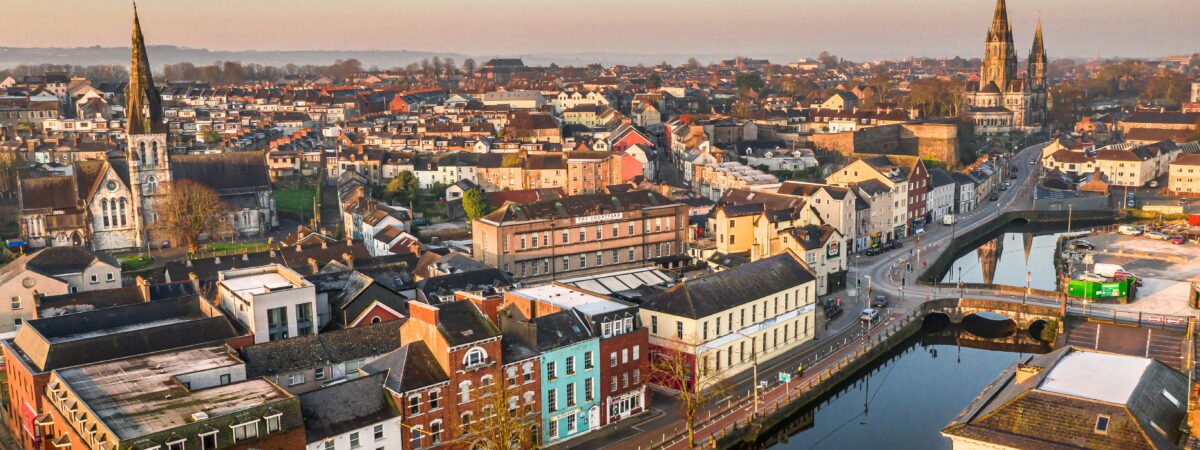
 Tourist attractions
Tourist attractions  Restaurants, irish pubs
Restaurants, irish pubs  Accomodations
Accomodations  Campings
CampingsLet’s face it: Cork is a city on the move, where it’s impossible to get bored! Cork is one of those Irish cities that are currently experiencing an exceptional cultural and economic boom. There’s no shortage of things to do in this student city, and you’ll have the pleasure of discovering the joys of a deeply vibrant city, between museums, heritage, concerts, fine dining and sightseeing!
The town’s earliest origins date back to the 6th century, when Saint Finbarr had a monastery built, where priests and devotees gathered for ecclesiastical training. This monastic life gradually expanded, forming a veritable hamlet where the knowledge of the time, the mastery of ancient texts and the learning of Gaelic were taught.
Over the years, Cork grew in size and was equipped with ramparts, some of which remain intact to this day.
However, the Viking invasions of the 8th century had unfortunate consequences for the city, which was subjected to numerous attacks and assaults. The town was regularly destroyed and rebuilt during this period. By the 12th century, the town’s influence had grown to become the most important city in the kingdom of Munster.
Cork soon became a strategic city for the English. They annexed it in 1185. This act triggered numerous battles between the English and Irish over the centuries, and in 1690 the city was repressed by the Protestant armies of William of Orange.
The 18th century was a critical period for the city, which suffered terrible losses during the Great Famine, losing over 25% of its total population. Many inhabitants decided to emigrate to the United States in search of a better life, draining Cork of its lifeblood.
The 1900s were a time of conflict, as the Irish continued their struggle to legitimize the creation of a free and independent Irish state. Cork was one of the cities to assert this desire to free itself from English oppression, supporting the actions of the IRA and protecting activists such as Michael Collins. During this struggle, Cork was the victim of numerous acts of violence, and the Black and Tans destroyed City Hall in a gigantic fire.
It’s important to note that throughout its history, Cork has remained unsubdued in the face of the enemy. This attitude has given Cork a reputation as a “rebellious” city, which, according to its inhabitants, is more deserving of the status of Irish capital than Dublin. (This claim sometimes makes Dubliners cringe… which creates rivalries between the 2 cities to this day).
The second half of the 20th century saw Cork become a profoundly industrial city, with many investors committing large amounts of capital to the development of shipyards and other high-tech and pharmaceutical companies. Today, Cork is experiencing a tremendous economic and cultural boom, making it a particularly pleasant place to live.
Don’t be fooled by the industrial complexes on the outskirts of the city. Cork is well worth a visit! The city lies 15km from the coast, at the end of a harbor that’s fairly well protected from maritime weather conditions.
We love its lively, vibrant streets, where ancestral traditions meet today’s more modern lifestyles. A true bridge between past and present, where each inhabitant lives at a hundred miles an hour, while remaining welcoming and accessible.
Among Cork’s must-see attractions, don’t miss the English Market, a food market that showcases the region’s gastronomic produce. Don’t miss a visit to the Blackrock Castle Observatory, a medieval castle that serves as a base for astronomical observations, or the Cork City Gaol, a historic prison that can be visited in its entirety.
Finally, Cork’s inimitable atmosphere can be found in the local Irish pubs and restaurants. It’s a real pleasure to sip a pint while listening to traditional live music. It’s a typically Irish atmosphere, where locals and travelers interact in a warm and friendly atmosphere!
To be experienced!